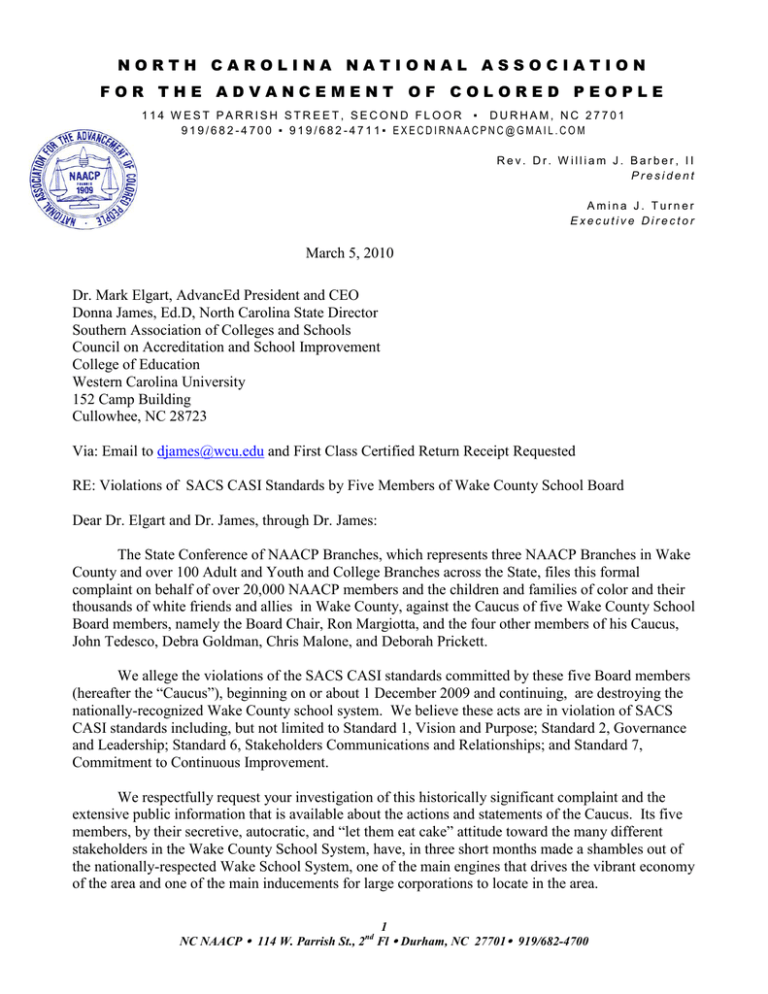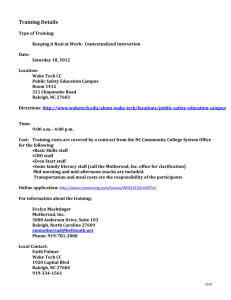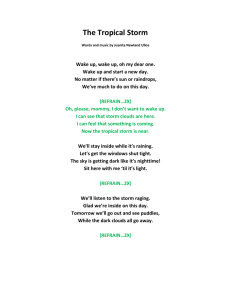N O R T H C A R... F O R T H E ...
advertisement

NORTH CAROLINA NATIONAL ASSOCIATION FOR THE ADVANCEMENT OF COLORED PEOPLE 114 W EST PARRISH STREET, SECOND FLOOR ▪ DURHAM, NC 27701 919/682-4700 ▪ 919/682-4711▪ EXECDIRNAACPNC@GMAIL.COM Rev. Dr. W illiam J. Barber, II President Amina J. Turner Executive Director March 5, 2010 Dr. Mark Elgart, AdvancEd President and CEO Donna James, Ed.D, North Carolina State Director Southern Association of Colleges and Schools Council on Accreditation and School Improvement College of Education Western Carolina University 152 Camp Building Cullowhee, NC 28723 Via: Email to djames@wcu.edu and First Class Certified Return Receipt Requested RE: Violations of SACS CASI Standards by Five Members of Wake County School Board Dear Dr. Elgart and Dr. James, through Dr. James: The State Conference of NAACP Branches, which represents three NAACP Branches in Wake County and over 100 Adult and Youth and College Branches across the State, files this formal complaint on behalf of over 20,000 NAACP members and the children and families of color and their thousands of white friends and allies in Wake County, against the Caucus of five Wake County School Board members, namely the Board Chair, Ron Margiotta, and the four other members of his Caucus, John Tedesco, Debra Goldman, Chris Malone, and Deborah Prickett. We allege the violations of the SACS CASI standards committed by these five Board members (hereafter the “Caucus”), beginning on or about 1 December 2009 and continuing, are destroying the nationally-recognized Wake County school system. We believe these acts are in violation of SACS CASI standards including, but not limited to Standard 1, Vision and Purpose; Standard 2, Governance and Leadership; Standard 6, Stakeholders Communications and Relationships; and Standard 7, Commitment to Continuous Improvement. We respectfully request your investigation of this historically significant complaint and the extensive public information that is available about the actions and statements of the Caucus. Its five members, by their secretive, autocratic, and “let them eat cake” attitude toward the many different stakeholders in the Wake County School System, have, in three short months made a shambles out of the nationally-respected Wake School System, one of the main engines that drives the vibrant economy of the area and one of the main inducements for large corporations to locate in the area. 1 NC NAACP 114 W. Parrish St., 2nd Fl Durham, NC 27701 919/682-4700 Although it is evident the five had been meeting as a Caucus before they were officially seated, on 1 December 2009, Ms. Goldman, Mr. Tedesco, Ms. Prickett and Mr. Malone swore on the Bible to uphold the United States and North Carolina Constitutions, and then, in lock-step, immediately unseated the experienced Chair mid-term and replaced him with Mr. Margiotta. With their 5-4 majority, they proceeded to ride roughshod over the minority rights of the 4 veteran educators and school board members who were also duly elected; over the rights of the African American parents, teachers and children who are major stakeholders in the Wake Schools, over the rights of the NAACP which has 101 years of experience advocating for the educational rights of children of color; and over the rights of the many other parents and students who believe that diversity in our public schools is a significant factor to 21st Century education. We note your Second Standard requires the Wake School System to provide “governance and leadership that promote student performance and system.” Compliance with this standard requires that the School Board: 2.1 Establishes and communicates policies and procedures that provide for the effective operation of the system 2.2 Recognizes and preserves the executive, administrative, and leadership authority of the administrative head of the system 2.2 Ensures compliance with applicable local, state, and federal laws, standards, and regulation 2.3 Implements policies and procedures that provide for the orientation and training of the governing boar 2.4 Builds public support, secures sufficient resources, and acts as a steward of the system’s resources 2.5 Maintains access to legal counsel to advise or obtain information about legal requirements and obligations We believe a review of the public record and investigation of the following specific allegations will lead SACS-CASI to find that Mr. Margiotta and the other members of the Caucus have violated dozens of the Board's own procedures in their mad rush to dismantle Wake County's nationallyrecognized student assignment plan based on FRL data to insure diverse student bodies and classes in its schools. There has been much speculation as to the reasons for this openly partisan attack on Wake's successful system and Superintendent. But there is no need to engage in speculation about the acts themselves, which include, but are not limited to: 1. The Caucus, representing a slim 5-4 majority on the 9-member Board, on information and belief, repeatedly caucuses in secret, both in face-to-face meetings, and via electronic and telephonic means. Such secret coordination violates the letter and spirit of the N.C. Open Meeting Law, which provides that anytime a majority of an elected body meets, it must notify the public, the press, and all the members of the body. 2. The Caucus has undermined the executive, administrative, and leadership authority of Superintendent Del Burns. They have made clear in public statements they do not respect his authority. When he gave the appropriate notice of his intention to resign as required by his 2 NC NAACP 114 W. Parrish St., 2nd Fl Durham, NC 27701 919/682-4700 contract and his conscience, the Caucus, on information and belief, secretly coordinated a public campaign to humiliate him by talking about his immediately termination. This campaign created a leadership vacuum during the same period they were announcing their plans to ghettoize parts of the faculty, staff and students of color and their families into socalled “neighborhood schools.” This is the euphemism their partisan political consultants have advised them to use, instead of the the direct and truthful words--all-Black, all-poor schools. The Caucus knew, or should have known, that their euphemistic code-words are painful insults to all people of color—particularly young children. Black people lived through the Pearsall Plan and other poorly disguised efforts to keep Black people in their Place—that is, in segregated neighborhood ghettos and the corresponding segregated schools. We can smell the meaning of these code-words from a mile away. Today such code-words also insult the many white families and students who have been, and remain, strong supporters of Wake's diversity policy. 3. On information and belief, the four recently-seated members of the Caucus were financially backed by a corporation that runs private schools in Wake County, a corporation that stands to profit from the tuitions of families of means who decide it is not worth the effort to maintain the stable, diverse system. 4. Mr. Margiotta openly referred to the many stakeholders of color at a public meeting as “animals” into his microphone, so that all could hear: “Here come the animals out of their cages.” http://pulse.ncpolicywatch.org:80/2010/03/04/margiotta-calls-parents-animals/ The obvious racial meaning of this remark is even more hurtful because, if the Chair of the Wake School Board feels comfortable in openly deriding people of color who have been waiting to make their public comment as “animals out of their cages” without fear of ostracism from his Caucus, we can infer the entire Caucus must feel free to express similar derogatory and racist attitudes toward people of color in their secret meetings. 5. The Caucus, on information and belief, has not maintained good faith access to the Board's long-serving legal counsel, thereby ignoring and dismissing their own (and their 4 colleagues in the minority) access to her experienced advice and information about the legal requirements and obligations of the Board. Instead they have established a backdoor relationship with another law firm that specializes in partisan political campaigns, and has little experience in school law in general, or the many Wake Schools' administrative procedures it has put in place over the years to guard the due process rights of the stakeholders, in the same spirit and best practices reflected in the SACS CASI Standards. We believe the members of the Caucus bring their own agenda to the meetings without any notice to their 4 colleagues or the public. This secretive agenda making and meeting planning violates the Open Meetings law and the Board's own rules. The secretive agendas, the meeting tactics, and the votes committed beforehand, effectively exclude many stakeholders from the effective administration of the largest school system in the State. These stakeholders, including the NAACP and most people of color, are deprived of notice and the opportunity to be heard about fundamental policy decisions the Caucus has already adopted in its secret, illegal meetings before the “Open Meeting” charade they perform for the public. 6. On information and belief, many of the acts in violation of these policies have been done in contradiction to the recommendation of the board's attorney. 3 NC NAACP 114 W. Parrish St., 2nd Fl Durham, NC 27701 919/682-4700 7. The Caucus had secretly decided to add to its list of qualified Board trainers an outfit run by the the same partisan ideologues who provided substantial financial, political, and tactical backing to their elections, which were targeted in the predominantly white suburban areas, with thinly disguised racist appeals to white parents. (See Enclosed Independent Article of 3/2/10) The policies and procedures of SACS CASI require that complaints alleging a school system's violation of standards must be forwarded to the superintendent for review and response. Please forward this Complaint to Dr. Del Burns quickly, since we believe Mr. Margiotta and his Caucus may try to terminate him to prevent him from reviewing and responding to our Complaint. We are making this complaint public, because we believe other parents, students, faculty,staff and other Wake School supporters will want to add their direct evidence of the misfeasance of these 5 people. We believe their actions have created an educational, social, and moral crisis for our community, which has heroically worked to rebuild the human community—indeed a human neighborhood. Yours in Truth and Justice, Rev. Dr. William J. Barber, II Encl: Independent Newspaper Article on Wake Schools, 3/2/10 c: Ms. Ann Majestic, Wake School Board Attorney NAACP Members in North Carolina Ms. June Atkinson, State Superintendent of Schools Ben Jealous, National NAACP President and CEO Angela Ciccolo, Interim National General Counsel, NAACP 4 NC NAACP 114 W. Parrish St., 2nd Fl Durham, NC 27701 919/682-4700 Click for larger image • At last Saturday's HK on J march, Josef and Lydia Edmonds march with their mother, Lynn, in protest of the newly elected Wake County School Board's proposal that would hurt diversity in the school system. Photo by D.L. Anderson Wake County goes to hell By Bob Geary Reprinted from the Independent Weekly website, Posted on 3 March 2010 Del Burns' abrupt resignation as Wake County's superintendent of schools made things clear, if they weren't already: The county is in crisis. The Wake school system, lauded as among the best in the nation and an engine for the county's growth, is in mortal danger from the newly elected school board majority and its right-wing backers. And just in case Wake's more centrist and progressive leaders on the board were thinking that Burns could hold the fort without them (and if that's not what they were thinking, why were they so quiet when all hell was breaking loose?), they were wrong. He couldn't. The new majority wasn't listening to anything he said. But they weren't firing him either. No, the five in the majority, led by Board Chairman Ron Margiotta, were content to use Burns as a prop—a Potemkin frontman—in a power play disguised as a deliberative review, with his input, of school assignment policies. That's what Burns meant when he resigned in protest Feb. 15 and said, in one of a series of interviews he gave two days later, "I will not allow myself to be a pawn in political gamesmanship." The new majority's policies, Burns warned, if allowed to take effect, would balkanize Wake's schools, chopping the unified system into separate "have" and "have-not" subdistricts—some 20 in all. High-poverty areas, or zones, would have high-poverty schools, despite extensive research about how that hurts the children forced to attend them. "I could not in good conscience implement the majority's policies," he said. Burns' resignation, effective June 30, was a clarion call for citizens to rally to the schools' defense. But rather than give the majority members pause, his resignation both infuriated them and caused them to throw off all pretense of moving carefully on assignment policies. They talked about immediately 5 NC NAACP 114 W. Parrish St., 2nd Fl Durham, NC 27701 919/682-4700 firing Burns for insubordination. And they rushed onto the agenda for their March 2 meeting a resolution calling for the subdistricts—termed "community assignment zones"—to be drawn up in time to start using them in the 2011-12 school year. Meanwhile, the Democratic majority on the Wake County Board of Commissioners reacted with— well, the impotence of the commissioners just made the crisis worse. Finally, Wake Democratic Chairman Jack Nichols moved to fill the county's leadership vacuum with a new candidate: Jack Nichols. The majority's plan to eliminate diversity as a factor in student assignments and adopt a strictly "neighborhood" (or "community") schools approach would overturn a political consensus that's existed in Wake since the county's and Raleigh's schools were merged with the onset of integration in 1976. After the merger, says John Gilbert, a retired N.C. State University professor who served on the school board for 16 years, Democratic and Republican members worked together to balance the two factors. They agreed, Gilbert says, that diverse student populations were critically important, and no school should be overwhelmed with low-income students. But neither should students be forced to travel long distances on a school bus. An award-winning program of magnet schools, started in the '80s, helped meet both goals, Gilbert says, by inducing students to travel voluntarily from suburban households to Raleigh's inner-city magnets. That mix of policies allowed Wake, in Gilbert's time, to avoid having schools with more than 40 percent of students eligible for the federal free and reduced-price lunch program. As the number of low-income students (especially Latino students) has increased from 20 percent countywide to 31 percent, and the county's suburban sprawl has exacerbated residential segregation by incomes, that target has slipped. According to county figures, there are currently nine elementary schools where more than 60 percent of students are free- and reduced-lunch eligible. But the other 150 schools have fewer eligible students, and no school rates as overwhelmed by low-income kids. Gilbert, a Democrat, ticks off a list of moderate Republicans who served with him on the board: Judy Hoffman, Roxie Cash, Henry Knight, Charlotte Martin, and Bill Fletcher, a staunch conservative who nonetheless backed diversity to the hilt. "There was never, never a partisan vote," Gilbert says. The consensus, Gilbert adds, was shared by Raleigh's business leaders, because they viewed good schools as vital to the city's economy. They helped defend it against the rise, in the mid-'90s, of sharpedged conservative politics in Raleigh and around the nation. (Think Newt Gingrich.) Led by Tom Fetzer, a Jesse Helms protégé who was elected Raleigh mayor in 1993, the GOP's right wing began fielding candidate slates in the school board elections, Gilbert says. They ran, Helms-style, against "forced busing," code for integration efforts that discomfited whites. Their goal was to wrest Republican-friendly districts from moderates like Hoffman and Cash. They never won. Indeed, the consensus was intact a year ago, according to Bill McNeal and Tom Oxholm. Their book, A School District's Journey to Excellence: Lessons from Business and Education, is a text for school officials and board members. Published early in 2009, it recounts how Wake's schools, though not perfect, "gained national recognition for the quality of their educational program." McNeal, the African-American insider, was superintendent of Wake schools before Burns. Based on Wake's achievements, McNeal was named "National Superintendent of the Year" by the American Association of School Administrators in 2004. 6 NC NAACP 114 W. Parrish St., 2nd Fl Durham, NC 27701 919/682-4700 Oxholm, the white Republican accountant, served on the school board from 1999 to 2003. His first brush with the schools, though, came after the '94 GOP landslide put a conservative bloc in control of the Wake Commissioners board. Oxholm was part of a group sent by the commissioners to expose the schools "as wasteful with taxpayers' dollars." Far from finding waste, Oxholm determined that the Wake schools were efficiently managed and, given the county's wealth and low taxes, a bargain. In fact, he and McNeal wrote, the biggest problem with the schools was chronic underfunding by the commissioners, Democrats and Republicans alike, especially for the new schools needed to keep pace with Wake's exploding population. In his foreword, former Gov. Jim Hunt declares, "The Wake County Public School System is among the best in the nation because of great leadership by some courageous school board leaders and educators ... and great support from community and business people in the county." Written in 2009, Hunt's words read today like they're from another era—or at least from a different battleground. Everything changed with the October 2009 elections, which swept the new majority into power based not on the unraveling of the consensus but rather on the votes of a tiny sliver—about 4.5 percent—of the county's electorate. In five of the county's nine school board districts, including the four districts representing most of Raleigh, there was no election at all. What the winning side lacked in sheer numbers, however, it made up for in anger and organization— and money. That combination shocked the consensus side, which for most of '09 seemed oblivious to the threat. "There's a Tea Party flavor to all this," writes Democratic political analyst Gary Pearce, co-author of the Talking About Politics blog in Raleigh. Indeed, the Wake election was the mirror image of the tea-party campaign mounted nationally last year against President Barack Obama's health care reforms. In both cases, a loud, relatively affluent minority was fighting to protect its rights as it perceived them ("my" health insurance, "my" schools). In both, people vehemently rejected any suggestion that what they have should be shared with others (the uninsured, schools in low-income neighborhoods). And in both, organizers were supplied and paid for by rich conservatives. In Wake County, in fact, the same multimillionaire conservative helped fund the anti-health care protests and the campaign to seize the school board: Raleigh businessman and former state Rep. Art Pope. Pope, personally and through the John William Pope Foundation named for his late father, pours millions into conservative groups, including the John Locke Foundation, Americans for Prosperity and the John W. Pope Civitas Institute, which, according to its most recent federal tax filings, received $1.6 million from the Pope Foundation in 2008—virtually all of its income. The AFP's Raleigh-based staff led the health care protests. The Civitas Institute, which describes itself as "a research and public policy organization dedicated to providing conservative solutions to North Carolina's pressing issues," perhaps offered advice to the school board candidates. The new majority is expected to vote this week to allow Civitas to provide "training" to the board members. In the school board campaign, Pope joined forces with fellow right-siders Bob Luddy, a Wake Forest businessman, and former state Rep. Russell Capps, president of the Wake County Taxpayers Association, in support of a new group called the Wake Schools Community Alliance. The WSCA fielded the four candidates who, along with the veteran Margiotta, now comprise the board majority. 7 NC NAACP 114 W. Parrish St., 2nd Fl Durham, NC 27701 919/682-4700 The Wake County Republican Party, led by Chairman Claude Pope, a distant cousin of Art Pope, backed the WSCA slate as well. For a variety of reasons, these men are fierce critics of public education in general and the Wake system in particular. Capps, a Christian fundamentalist, doesn't like evolution being taught to students as a widely accepted and evidence-based scientific theory. Art Pope thinks the public schools are an inefficient monopoly, with Wake's 159-school system a prime example. Luddy has used his money to start a charter school in Franklin County and two private schools—both named Thales Academy—in Wake Forest and Apex. On the board of the Apex academy: Ron Margiotta, the head of Wake's public school board. Luddy summed up his critique in a recent letter to The Cary News. "Public schools are wracked by discipline problems," Luddy wrote, "and many parents want out of them. The time has come to reevalute our approach to educating our youth, and the solution is not complicated. Parents want choice for their children, based on their own values and beliefs." Luddy called for a state tax credit of $2,500 per student, with some limits on family income, for children who attend private schools. "Expand[ing] the educational options across the state," he said, "will inspire a healthy competition between schools." As the crisis in Wake unfolds, supporters of the school system—and the old consensus—are finally showing some life. The newly formed Great Schools in Wake Coalition was launched with the help of WakeUP Wake County and other civic groups. It now counts 29 organizations as members, representing some 10,000 people, according to Yevonne Brannon, its chair. "We are literally standing up and fighting for the soul of our community," Brannon told an audience of about 75 at a forum in Knightdale last week. On Saturday, the top issue for a thousand people who marched in the NAACP's annual "HJ on K" event in Raleigh was the schools crisis. "We say 'never again' to resegregation," the Rev. William Barber, state NAACP president, declared. "You gotta admire this about the ultra-right," Barber added. "They are organized. We need to organize to fifth power." Even as they do, however, they confront the fact that Wake's systems of government are a vestige of the consensus age and very poorly adapted to the new era of hard-edged, big-money conservative politics. In the consensus age, it made sense to hold school board elections in the odd-numbered years (and in October), when turnouts would be low. The idea was to let the most knowledgeable, avid supporters of the schools choose the board. As a check on their enthusiasms, however, the county commissioners were given control of school budgets. But in the new era, these low-turnout elections are ripe for a charged-up, Tea Party takeover. And if, as they promised in their campaign, the new majority intends to run the schools for the same amount of money or less—"starving the beast," in Tea Party parlance—the commissioners' ability to block them is limited. The commissioners can reserve budget funds for a specific purpose—for aid to high-poverty schools, say—and bar their use for something else the school board might prefer (new courses in the suburbs, for example). But while they can earmark funds, if the school board leaves the money in the bank, there's nothing the commissioners can do about it. 8 NC NAACP 114 W. Parrish St., 2nd Fl Durham, NC 27701 919/682-4700 To make matters worse, the current commissioners board is totally dysfunctional. Though nominally controlled by a 4-3 Democratic majority after the party won all three seats in the '08 Obama landslide, it is missing its 84-year old former chairman, Harold Webb, since he suffered a stroke in October. And the three remaining Democrats managed to let Republican Tony Gurley win the chairmanship when Betty Lou Ward made an "unexcused" visit to the bathroom. Think of it as a metaphor for a party in the dumper. Or a county. The fact that the gavel is now in Gurley's hands means that Stan Norwalk, the one Democrat who's spoken out repeatedly against the new majority, is routinely silenced—and often ridiculed—for trying to raise school issues at the commissioners' meetings. It also means that the Republicans will control the budget process this spring. A draft 2010-11 budget shows a cut in school aid. But even if the Democrats were a powerhouse, the fact that the commissioners are a poorly paid, parttime board (salary: $19,096 a year) is another vestige of the consensus era. The county is run day-today by an unelected county manager. The commissioners are like a corporate board, with the power to establish policies and the budget but with few resources at their disposal to influence public opinion. It's assumed they don't need to. But what worked well enough three decades ago, when Wake's population was half what it is now and its suburbs were farms, doesn't work in a county of 850,000 people who are spread from Apex to Zebulon. And the Democrats are no powerhouse. To say there is a vacuum of political leadership in Wake County today is only to state the obvious. A strong voice would be needed to reach the voters across the county. The Democrats don't have one—or they didn't until last Friday. The decision by the party's chairman, Jack Nichols, to run for the commissioner seat now held by Republican Paul Coble offers the chance, at least, of a headliner race between an experienced Democratic leader and the über-conservative former Raleigh mayor. Nichols, a former commissioner who served in consensus days, jumped in just before the filing deadline, when it appeared that no one would take on Coble. If the Democrats had let Coble be reelected without opposition, it would've underscored their weakness in the face of the right-wing assault. Nichols decided that couldn't happen. The best chance to slow down the new majority rests with Nichols and the other Democratic candidates—incumbent Commissioner Lindy Brown, Steve Rao and Don Mial. (The last two are challenging Republicans Gurley and Joe Bryan, respectively.) If they can turn the election into a referendum on whether the school system should be improved (and how) or torn apart, and win it, they can set the stage for the election of a different school board majority in 2011, using districts based on the new census. The assault on the school system is far from over. The adoption by the new majority of its "community zones" resolution puts a process in motion, but to execute it without wrecking the schools—by overcrowding some schools and leaving others half-empty—they'll need more money, not less. And more new schools than the voters have so far authorized in bond issues. That means a Democratic commissioners board could slow them down, if not actually convince them that the old consensus held—and still holds—for a reason. A balanced school system, with neighborhood-friendly assignments and diversity, is still—as Tom Oxholm discovered when he tried to prove it wasn't—the most efficient and best way to serve all the students of Wake County. 9 NC NAACP 114 W. Parrish St., 2nd Fl Durham, NC 27701 919/682-4700 10 NC NAACP 114 W. Parrish St., 2nd Fl Durham, NC 27701 919/682-4700



